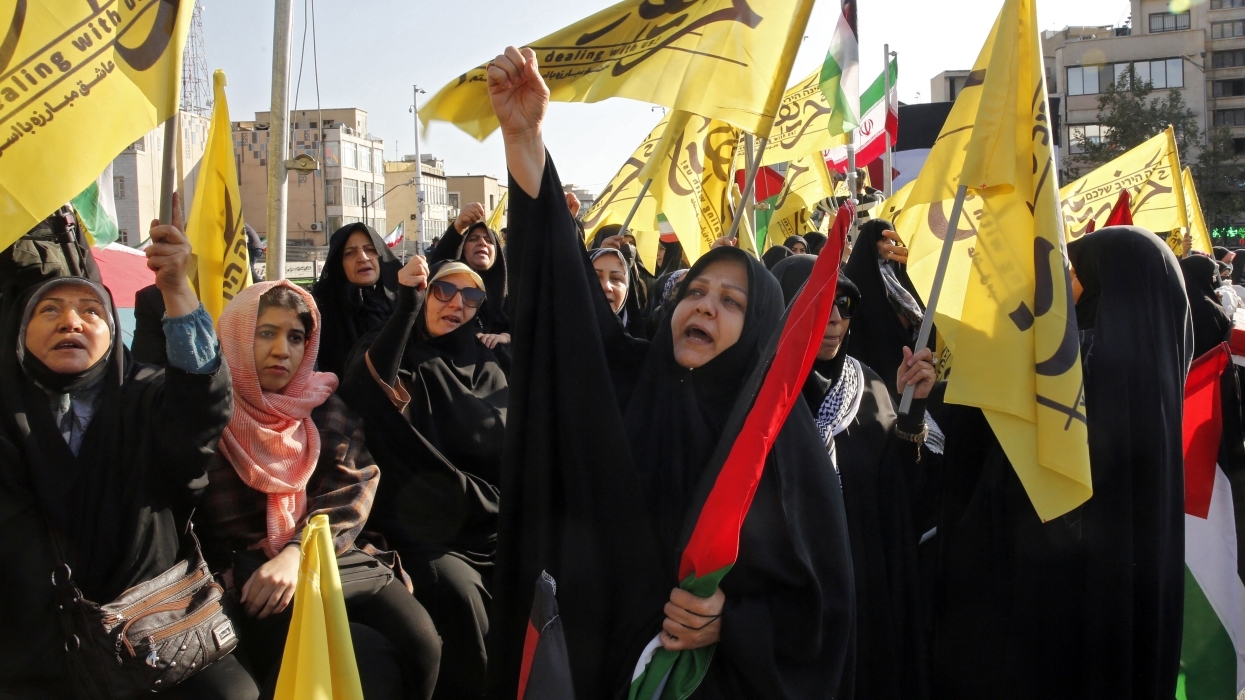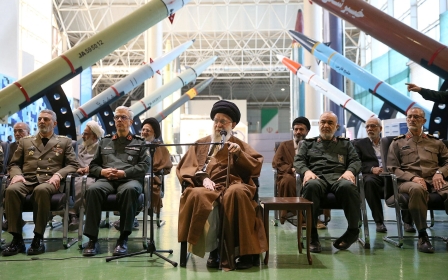Iranian press review: Revolutionary Guard media cheer Gaza truce as Israel 'surrenders'

IRGC-affiliated outlets paint Gaza truce as Hamas victory
Iranian outlets affiliated with the Islamic Revolutionary Guard Corps (IRGC) have celebrated the Qatar-mediated agreement between Israel and Palestinian groups, painting it as an Israeli defeat.
On Wednesday, the country's state-run news agency, IRNA, declared the temporary truce as the Hamas movement's triumph over the Israeli army.
Under the headline, "Temporary truce or the kiss of death to the Zionist regime", IRNA's hardliner columnist Abdolreza Hadizadeh Naeini suggested that the deal is stark evidence of Israel waving the white flag in the Gaza war.
"The ongoing ceasefire is a solid indication that Israel has not hit any of its goals despite the war and the savage military attacks it started," he wrote.
Stay informed with MEE's newsletters
Sign up to get the latest alerts, insights and analysis, starting with Turkey Unpacked
The article continued with unconfirmed reports, claiming: "Since the Israeli land incursion began, they have not found a single hostage, killed or arrested a key member of the Hamas military arm, or even discovered one of the sophisticated networks of Hamas tunnels."
On Tuesday, the Javan daily, affiliated with the IRGC, hinted that the Palestinian groups are on the brink of victory in the Gaza war because of the temporary truce; however, the daily labelled it as a ceasefire.
Under the headline "Resistance's fire forced Israel to surrender to a ceasefire," it suggested that the truce was the payoff for the high death tolls incurred by Israeli forces during the war.
"The agreement was reached under a situation where Israel's losses on the battlefield have dramatically increased," the daily wrote.
Despite official reports tallying the total number of Israeli soldiers killed after the ground invasion at 71 on Wednesday, the Fars news agency echoed Javan's claims, stating in a report that "between 20 and 30 Israeli soldiers were killed" every day since the start of the war.
Oil and gas experts flock to Iraq
A surge in the migration of Iranian oil and gas engineers to Iraq has been reported in recent months, fuelled by enticing salaries and lucrative contracts, according to a report by the Ham Mihan daily.
On Tuesday, it wrote that Iranian experts in Iraq received salaries between five and 10 times higher than in their home country. Ham Mihan added that the immigration of energy experts had caused a severe brain drain in this field in the oil-rich country.
Iran's oil and gas industry has been in a crisis because of the international sanctions that targeted the industry's infrastructure and the renovation of its dated technology.
The report also noted that Russia and China, leading investors in Iran's oil and gas industry, had shifted their focus to Iraq, attracted by more advantageous contracts offered by Baghdad to foreign firms.
Elina Bagheri, director of Iran's Association of Drilling Companies, stressed in an interview with Ham Mihan that Iranian government policies had strongly affected exploration and drilling firms.
"We offer contracts fraught with risk, ambiguity, and complications, featuring low return rates that fail to attract any investment," said Bagheri, as quoted by Hami Mihan.
In explaining the root causes behind Iran's oil and gas production decline, Bagheri emphasised: "With these regulations, we have essentially imposed sanctions on ourselves. In the absence of foreign investors, we have not even permitted domestic investors to bridge the gap. The lack of investment has inevitably led to a reduction in production."
Former vice president sentenced to prison
Eshaq Jahangiri, who served as the first vice president for eight years under former President Hassan Rouhani, received a 12-month sentence in a case brought against him by Parliamentary Speaker Mohammad Bagher Ghalibaf, the ISNA news agency reported on Saturday.
The case stemmed from a 2017 presidential election television debate, in which Jahangiri referenced corruption cases related to Tehran Municipality during Ghalibaf's time as mayor.
Ghalibaf then filed a complaint against Jahangiri, accusing him of spreading false information.
In the 2017 election, Rouhani was re-elected for a second term and appointed Jahangiri as his deputy.
Ghalibaf, a key member of the Islamic Revolutionary Guard Corps (IRGC), has faced allegations of involvement in various corruption cases and scandals, though the judicial system has not formally charged him.
Jahangiri's lawyer, Sarvarosadat Moqimi, expressed her intention to appeal, stating: "There were many defects in the case."
Meanwhile, several politicians, including conservatives such as Mohammad Mohajeri, criticised the IRGC figure for being intolerant of the slightest criticism.
Mohajeri also urged Ghalibaf to engage in a discussion about the corruption cases in which he was implicated, saying: "If you don't mind revisiting the past, I invite you to talk about the Yas Project - a project that you and we are well aware of its history."
Regarding Ghalibaf's complaint against Jahangiri, Mohajeri added: "If your complaint against Mr Jahangiri led to a closed-door court decision, and a judge issued a verdict, in this discussion, millions of observers will act as judges, assessing your performance and testing your commitment to transparency."
* Iranian press review is a digest of news reports not independently verified by Middle East Eye
Middle East Eye delivers independent and unrivalled coverage and analysis of the Middle East, North Africa and beyond. To learn more about republishing this content and the associated fees, please fill out this form. More about MEE can be found here.






